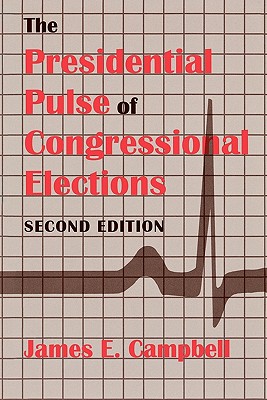

 University Press of Kentucky
University Press of Kentucky
The Presidential Pulse of Congressional Elections, Second Edition


Key Metrics
- James E Campbell
- University Press of Kentucky
- Paperback
- 9780813109268
- 9.25 X 6.19 X 0.86 inches
- 1.31 pounds
- Political Science > Political Process - Campaigns & Elections
- English
 Secure Transaction
Secure TransactionBook Description
An intriguing phenomenon in American electoral politics is the loss of seats by the president's party in midterm congressional elections. Between 1862 and 1990, the president's party lost seats in the House of Representatives in 32 of the 33 midterm elections. In his new study, James Campbell examines explanations for these midterm losses and explores how presidential elections influence congressional elections.
After reviewing the two major theories of midterm electoral change-the surge and decline theory and the theory of midterms as referenda on presidential performance Campbell draws upon each to propose and test a new theory. He asserts that in the years of presidential elections congressmen ride presidential coattails into office, while in midterm elections such candidates are stranded. An additional factor is the strength of the presidential vote, which influences the number of seats that are won, only to be lost later.
Finally, Campbell examines how the presidential pulse may affect electoral accountability, the relationship between Congress and the president, and the relative strength of Congress, the president, and political parties. He explores the implications of the presidential pulse for understanding electoral change, evaluating the American voter'scompetence, and assessing the importance of split-ticket voting.
Including both election returns and survey data, The Presidential Pulse of Congressional Elections offers a fresh perspective on congressional elections, voting behavior, Congress, and the presidency.
Author Bio
James E. Campbell is a UB Distinguished Professor of political science at the University at Buffalo. He is the author of four university press books and more than 80 journal articles and book chapters.
His most recent book is Polarized: Making Sense of a Divided America (Princeton University Press). His other books include The American Campaign: U.S. Presidential Campaigns and the National Vote (Texas A&M, 2000 and 2008), Cheap Seats: The Democratic Party’s Advantage in U.S. House Elections (Ohio State, 1996), and The Presidential Pulse of Congressional Elections (Kentucky, 1993 and 1997).
He also co-edited Before the Vote and edited thirteen journal symposia on election forecasting. He has served as Chair of the Political Forecasting Group (APSA), as President of Pi Sigma Alpha (the national political science honor society), as a Congressional Fellow of the American Political Science Association, and as a program director of the Political Science Program at the National Science Foundation.
He has been a member of six editorial boards of political science journals and seven executive councils of political science organizations. Prior to joining the UB faculty in 1998, he was on the faculties of the University of Georgia from 1980 to 1988 and Louisiana State University from 1988 to 1998. He was Chair of UB’s Department of Political Science from 2006 to 2012.
Education
PhD, Syracuse University
MA, Syracuse University
AB, Bowdoin College, summa cum laude
Source: University at Buffalo Department of Political Science
Videos




Community reviews
Write a ReviewNo Community reviews